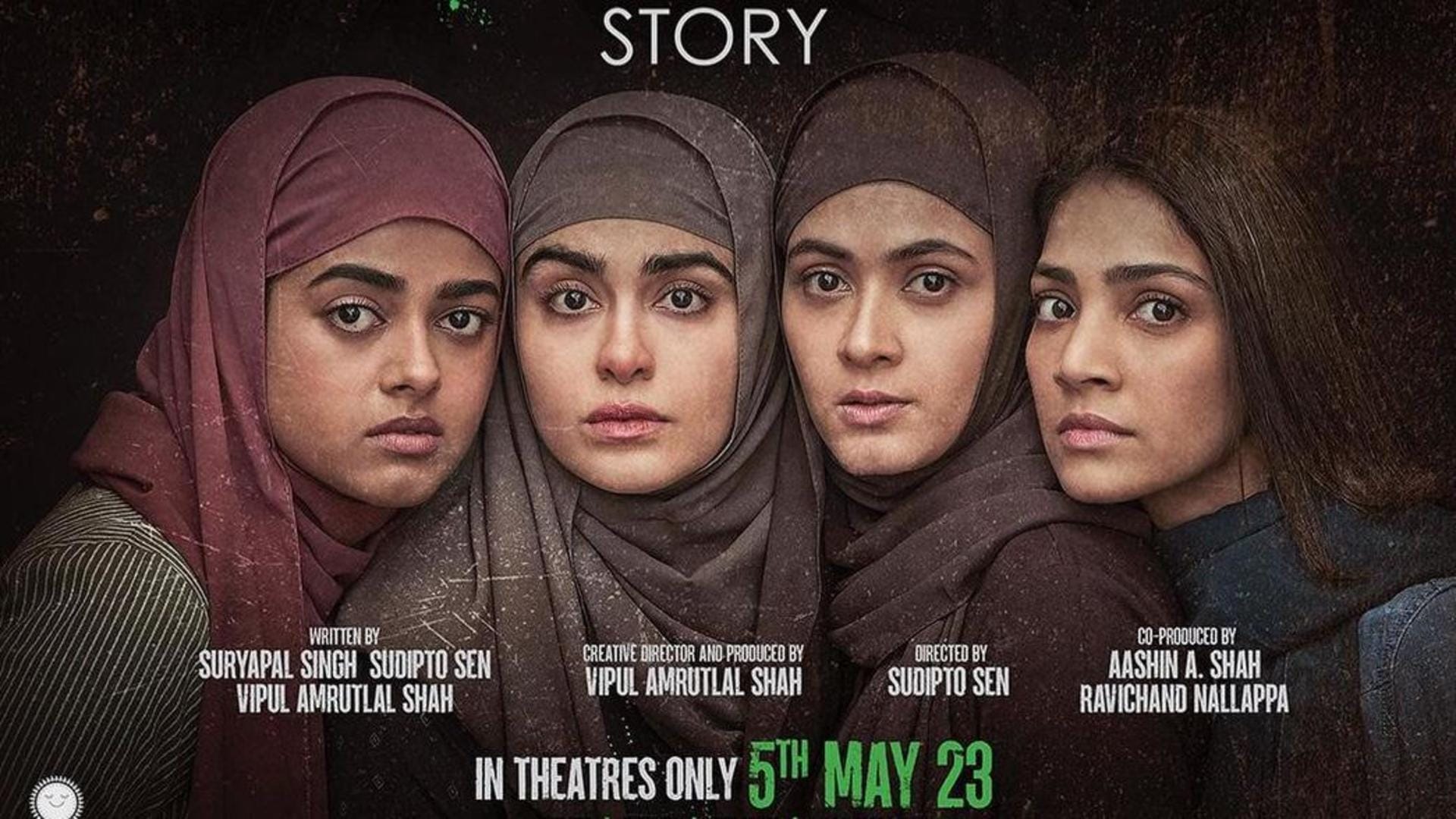To watch and inevitably condemn or to not watch and surrender the right to criticise- it is the question that I asked myself as I watched the trailer of The Kerala Story with tired resignation and disbelief. It is highly reminiscent of The Kashmir Files, with the promise of manipulation of facts, and statistics, emotional exploitation of a sensitive incident, and the filmmaker’s best shot at inducing mass hysteria against a threat that is largely a product of the director’s imagination.
The film is based on the story of 3 women, played by Adah Sharma, Yogita Bihani, and Siddhi Idnani, who were converted to Islam and were made to join ISIS in the name of love. The film follows three nursing students who went to Kasargod for their higher studies. They were brainwashed and indoctrinated by their Muslim classmate Asifa, played by Sonia Balani, who had been working as a recruiter for ISIS. The girls convert to Islam, marry a Muslim man, and are trafficked to Afghanistan.
Films are one of the most effective means of spewing propaganda and director, Sudipto Sen, makes the best use of it to tell a known story in an unknown foil of exaggeration and half-truths. I trust all that the film promises in its trailer and refrain from witnessing it play out on the big screen. The film is based on the story of 3 women, played by Adah Sharma, Yogita Bihani, and Siddhi Idnani, who were converted to Islam and were made to join ISIS in the name of love. The film follows three nursing students who went to Kasargod for their higher studies. They were brainwashed and indoctrinated by their Muslim classmate Asifa, played by Sonia Balani, who had been working as a recruiter for ISIS. The girls convert to Islam, marry a Muslim man, and are trafficked to Afghanistan.
The trailer of the film claims that 32,000 girls are missing in Kerala and have been recruited into ISIS. The trailer also portrays one of the girls hysterically warning, “50,000 girls are missing in Kerala and that the ex-chief minister has said Kerala will become an Islamic state in a few years”. Many people since then have pointed out massively extrapolated numbers and hysteria-inducing treatment of the film’s plot. At the end of the trailer, Shalini Unnikrishnan played by Adah Sharma says, “I am not alone, there are thousands of girls from Kerala who ran away from home.”
The film director claims that The Kerala Story is based on hard facts and that the film is a product of seven-year-long tenacious research. However, the veracity of the numbers the film proclaims cannot be justified even at its highest approximation. No official record exists that can verify that 32,000 missing women have joined ISIS, and neither does anyone know what exactly happened to the woman, Fatima Ba, on whose life the film is based.
The film director claims that The Kerala Story is based on hard facts and that the film is a product of seven-year-long tenacious research. However, the veracity of the numbers the film proclaims cannot be justified even at its highest approximation. No official record exists that can verify that 32,000 missing women have joined ISIS, and neither does anyone know what exactly happened to the woman, Fatima Ba, on whose life the film is based.
Indian audiences are not new to films like The Kerala Story which expends its creative licence to paint the picture of an imaginary enemy that all should fear and unanimously hate. Petitioners have argued at the High Court that the existence of LoveJihad has not been detected in Kerala by any investigating body or agency. However, the Kerala High Court ruled last Friday that the film does not contain anything offensive against any community in particular and has allowed its release. The Kerala High Court also says that “We find that the producers have published a disclaimer along with the movie, which specifically states that the film has been fictionalised and is a dramatised version of events.”
In 2019, The Observer Research Foundation reported that 60 to 70 individuals joined ISIS between the years 2014 to 2018. In 2020, the US Department noted that there were 66 Indians who were part of the organisation at the time. The Indian Government report also reports that approximately 100 to 200 individuals from India have joined ISIS, making it one of the smallest groups given the substantial Muslim population present in the country.
In 2019, The Observer Research Foundation reported that 60 to 70 individuals joined ISIS between the years 2014 to 2018. In 2020, the US Department noted that there were 66 Indians who were part of the organisation at the time. The Indian Government report also reports that approximately 100 to 200 individuals from India have joined ISIS, making it one of the smallest groups given the substantial Muslim population present in the country.
Also Read: ‘The Kashmir Files’: India’s ‘Schindler’s List’ Or Right-Wing Extremist Propaganda?
If it had been the film’s primary aim to spread awareness of and dangers of a particular terrorist organisation without targeting Muslim minorities, it would not base its premise on gross misinformation and half-baked facts. The dialogues of the characters veer between the hysteric pronunciation of impending doom and burlesque insincerity. The trailer itself leaves absolutely nothing to the imagination. The film also briefly squeezes in how the burqa-clad Asifa convinces the girls to wear burqa with the promise- “no woman wearing a burqa has been sexually harassed or raped by a man”. It seems like a slight nod to the discriminatory ban on the burqa that is increasingly taking over in educational institutions.

Actress Adah Sharma, who plays Fatima Ba in the film has appealed to the protesters by tweeting, “ “Many senior persons in high posts have commented on #TheKeralaStory after watching the 2-minute trailer. My parents have always asked me to respect my elders so with due respect to all of them I hope they can take 2 hrs out of their busy schedule and watch the movie. I’m sure they will see that we haven’t shown Kerala in any derogatory light. Jai hind.”
Also Read: Care, Mischief And Injustice In The Elephant Whisperers
Perhaps, it is not feminist to call for a ban on any artistic expression even if it simply acts as a mouthpiece for hateful propaganda. But films that peddle such misinformation and use an emotionally exploitative gaze to strike fear and anxiety at the heart of the audience, especially in a country where films hold immense power over the minds of the audience, are dangerous. It leads to more violence, tensions, and communal discord in the country.
Modi, almost an unofficial brand ambassador of the film, promoted it by adding, “‘Such a beautiful state, whose people are so hardworking and talented. The Kerala Story film, The Kerala Files, film, has exposed the designs of terrorists in such a state.” The Telegraph reports, ”Carried away by his rhetoric, the Prime Minister unwittingly offered an insight into the sources of his information and scholarship, mixing up The Kerala Story and The Kashmir Files and completing a propaganda jigsaw.”
The film hit the theatres last week and opened with a box office collection of 8 crores. The film was declared tax-free by Shivraj Singh Chouhan, Chief Minister of Madhya Pradesh, last Saturday to encourage more people, especially young girls, to watch this film.
Modi, almost an unofficial brand ambassador of the film, promoted it by adding, “‘Such a beautiful state, whose people are so hardworking and talented. The Kerala Story film, The Kerala Files, film, has exposed the designs of terrorists in such a state.” The Telegraph reports, ”Carried away by his rhetoric, the Prime Minister unwittingly offered an insight into the sources of his information and scholarship, mixing up The Kerala Story and The Kashmir Files and completing a propaganda jigsaw.”
Also Read: Narrating A Story Of Sisterhood And The Struggle Across Borders Through ‘Ayisha’
The Kashmir Files was also declared tax-free by PM Modi and was massively promoted because it adhered to the right-wing agenda of targeting one community. With the help of government endorsement, The Kashmir Filles had amassed a box office collection of over Rs. 300 crores and had gained a 10/10 rating on IMDB. Last year it was also sent to the International Film Festival of India (IFFI) awards ceremony where Israeli filmmaker Nadav Lapid boldly condemned it as a vulgar propaganda movie. It is possible that The Kerala Story too will find a similar pattern of success while many impressionable minds would fall prey to the propaganda that it inadvertently sells.
About the author(s)
Debabratee (she/they) is a student of English Literature at Jadavpur University. When they are not found reading or writing, they are found running after their pet dog and cuddling with him. They are avid binge-watcher of all kinds of OTT content and like to dissect and analyse them in their free time.




